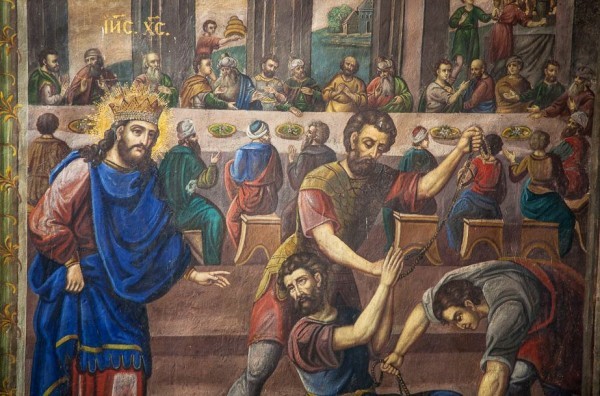We have just heard the Lord’s parable about those bidden to the wedding feast (Matthew 22:1-14), a parable about how God calls people to His supper, but people – for one reason or another – refuse to respond to God’s call.
Like the other parables of Jesus, it has several levels of meaning. It relates first of all to the Jewish people, to whom God from century to century sent prophets, whom they rejected, and who later rejected the Beloved Son of God, Who came to save this nation. But in a broader sense this parable speaks of many other nations. God called not only the Jewish nation, but in various periods He also called other nations, whom he wanted to make God-bearing nations, but they either did not respond to God’s call or turned out to be unworthy of this call. But a nation is not an abstract concept: a nation is all of us, each one of us. And everything that happens in a nation reflects on each one of us; and, vice versa, everything that happens to us reflects on the nation as a whole. From this follows another meaning of the parable: it is addressed to every specific person, to each one of us.
We are very often incapable of responding to God’s call. Sunday comes around, and either out of laziness and negligence, or out of coldness and hardness of heart, we do not want to go to church, putting off going to church until the next Sunday. We reject God’s call when, coming to the Divine Liturgy, we do not commune of the Holy Mysteries, likewise out of laziness and negligence, or because we have not prepared for Communion, not having read the required rule. But preparation for receiving Christ’s Holy Mysteries is not simply a matter of reading prayers. We need to prepare for participation in the Lord’s Trapeza our entire lives. The Apostle Paul says: “Let this mind be in you, which was also in Christ Jesus” (Philippians 2:5). And preparation for receiving the Holy Mysteries of Christ lies precisely in each one of us having this mind. This is the “wedding garment” of which the parable speaks. The Lord calls each one of us, but we should not simply respond to this call and come to the wedding feast in just any old way. We need to spend our whole lives in fulfilling Christ’s commandments, in good deeds, in prayer and repentance preparing for Communion.
We have no right to receive Christ’s Holy Mysteries if we do not have that mind that was in Christ Jesus. It is Christ that is the image that we must follow. We do not have the right to approach Christ’s Holy Mysteries if we carry a grudge against someone or if we ourselves have offended someone. The Lord says: “Therefore if thou bring thy gift to the altar, and there rememberest that thy brother hath ought against thee; Leave there thy gift before the altar, and go thy way; first be reconciled to they brother, and then come and offer thy gift” (Matthew 5:23-24). Every time that Sunday approaches, we should ask ourselves: do we approach God with peace of conscience and at peace with our neighbors? Are we ready to approach Christ’s Holy Mysteries or not? Do we bear within ourselves the mind that was in Jesus Christ, that is, to what extent is our life an imitation of the life of Christ, God Incarnate? If we receive Christ’s Holy Mysteries without having been reconciled with God, with ourselves, and with our neighbors, then the same thing can happen to us that happened to the man who came to the supper without a wedding garment. The king, seeing this man, said to his servants: “Bind him hand and foot, and take him away, and cast him into outer darkness; there shall be weeping and gnashing of teeth” (Matthew 22:13).
Our eternal fate depends upon how we commune and how we approach God: will we be cast into “outer darkness,” where there is “weeping and gnashing of teeth,” or will we be found worthy of the promised Heavenly Kingdom? Our fate is decided when we, having heard God’s call, respond to it or not, and care for our “wedding garment” or not. And this call sounds unceasingly. Every minute, every hour, and every day of our lives we hear God’s call, and at any given moment we make choices between good and evil, between God and the devil, between light and darkness – a choice upon which our future depends. Amen.
2000.
Translated from the Russian.


















